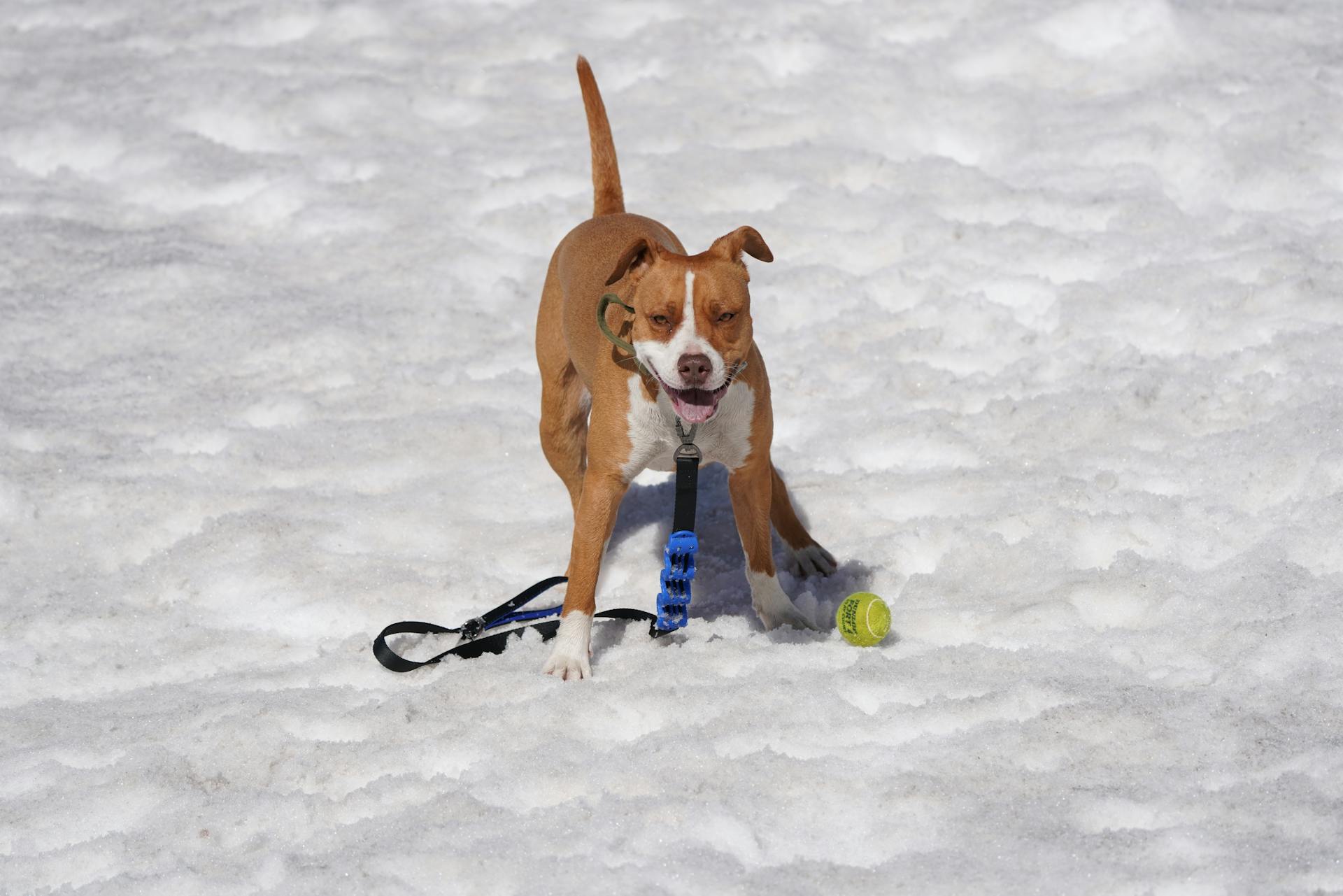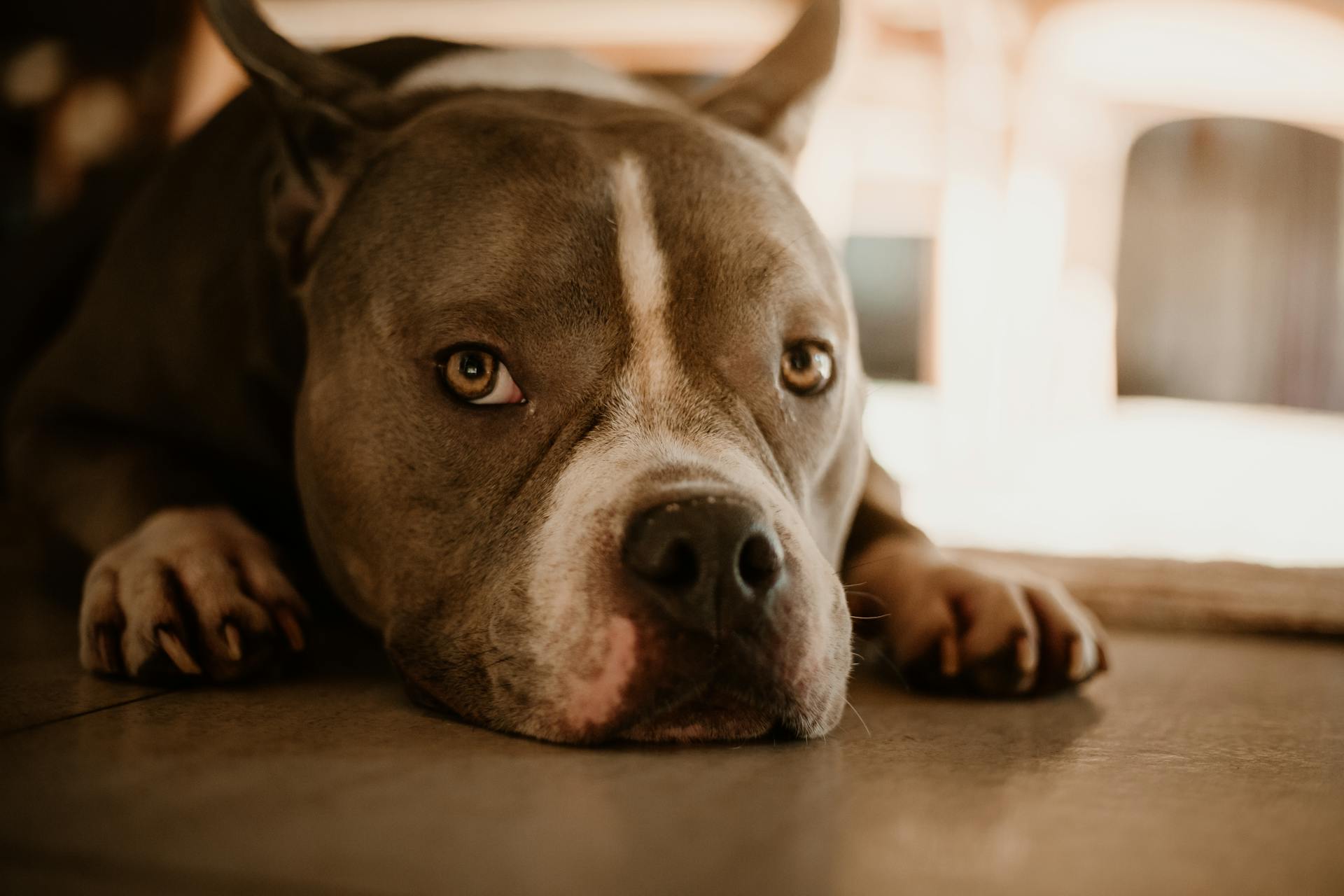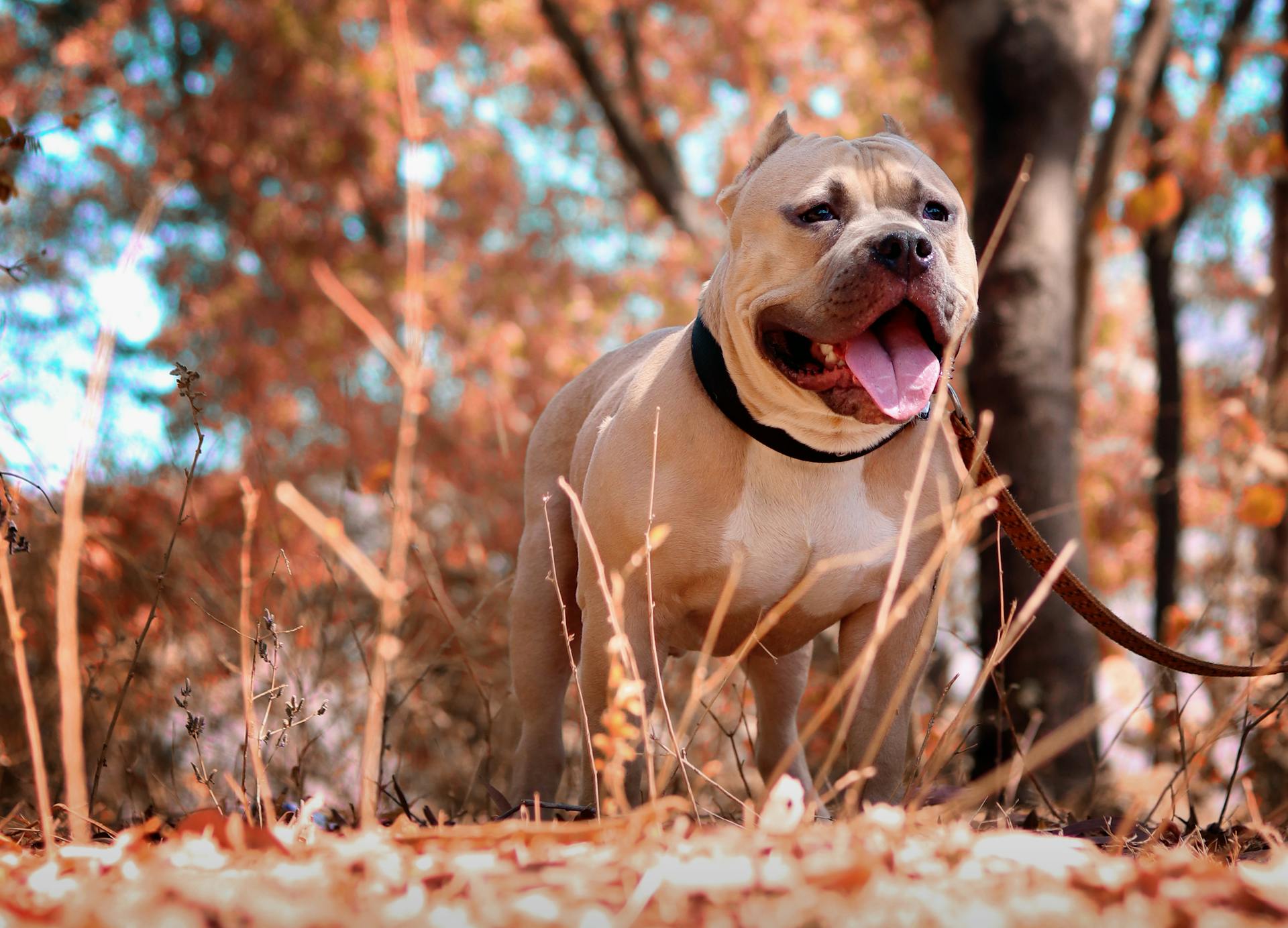
A Pitbull's ideal weight is between 35-60 pounds, depending on their muscle mass and height.
To achieve this, we need to create a balanced feeding plan that meets their nutritional needs.
A Pitbull requires a diet rich in protein, moderate in fat, and low in carbohydrates.
This means feeding them high-quality dog food that contains at least 25% protein, such as chicken or beef.
High-Quality Food
A well-balanced diet is crucial for any dog, but for a Pitbull, it's especially important. Good quality dog food is the foundation of a healthy diet, and it's essential to choose a food that's high in protein, vitamins, and minerals.
Pitbulls are lean, active dogs that require a diet rich in protein to build and repair muscle fibers. A good quality dog food should have named meat protein sources like beef, buffalo, lamb, or chicken, and avoid foods with artificial ingredients like food dyes.
When selecting a high-quality dog food, look for a brand that's rich in protein and fat, and has a balanced macronutrient ratio. Ideally, the food should be around 30% protein and 25% fat. You can also consider adding supplements like omega fatty acids, glucosamine, and chondroitin to support your dog's overall health and performance.
See what others are reading: Good Dog Food for Pitbull Bullies
Here are some key nutrients to look for in a high-quality dog food:
- Protein: 30% or higher
- Fat: 25% or higher
- Carbohydrates: moderate amounts (not too high)
- Vitamins and minerals: essential for overall health and well-being
Some good options for high-quality dog food include:
- Organic dog food brands
- Food with named meat protein sources
- Food with healthy fats like omega-3 fatty acids
Remember, every dog is different, so it's essential to work with your veterinarian to determine the best diet for your Pitbull. They can help you choose a high-quality dog food that meets your dog's specific needs and health goals.
New Feeding Schedule
If your Pitbull eats twice a day, consider giving him a smaller portion in the morning and a more considerable amount in the evening before bedtime. This helps his body store fat while sleeping rather than burning it off.
Feeding your dog small meals frequently can also aid in weight gain. By spreading his daily doses of food over three or four meals, your Pitbull will receive nutrients throughout the day.
Wait at least half an hour after a meal before exercising your dog, as this allows for proper digestion and prevents discomfort. I've noticed that dogs who exercise too soon after eating can get stomach cramps and diarrhea.
Feeding your Pitbull small meals several times a day allows you to monitor his food intake and ensure he's eating enough. This is especially helpful for underweight dogs who need to gain weight.
If your Pitbull seems to be eating normally but still isn't gaining weight, it may be that you're not feeding him enough. You can try increasing his meal portions to see if that makes a difference.
Treats and Supplements
Peanut butter is a great treat to help your dog gain weight, as it's high in healthy fats. You can try feeding it to your dog as a treat, and combine it with a vegetable like carrots to reduce the chances of an upset stomach.
Eggs are another nutritious snack that can help your dog gain weight. They're loaded with healthy fat and protein, and provide amino acids that your dog needs but can't produce naturally.
Cottage cheese is a great option to add to your dog's food, as it's full of fat and can help them gain weight. You can mix it with other healthy proteins like ground turkey or beef for a tasty and nutritious treat.
A unique perspective: Fat Pitbull Dog
Rice is a good source of carbs that can help your dog gain weight, but it's not enough on its own. You can add it to their food along with other healthy proteins to help them gain weight faster.
Here are some other healthy treats you can add to your dog's food to help them gain weight:
- Cottage cheese - full fat
- Lean meat - raw or cooked depending on your dog's regular diet
- Quinoa - it provides usable energy and contains amino acids for muscle building
Remember to talk to your vet before making any changes to your dog's eating habits, and keep track of their meals, treats, exercise, and weight changes in a journal.
Health and Growth
Pit Bull growth and weight can vary significantly, even within the same litter. This is because all puppies grow at their own rate, and the breed is prone to variances in their final size.
Keep in mind that the following numbers are estimates and should be used as a general guideline. Consult with your veterinarian if you have concerns about your Pit Bull's growth and weight.
On a similar theme: Pitbull Dog Growth Chart
A Pit Bull's weight can range from 25 to 60 pounds, depending on their age and sex. Here's a rough estimate of a Pit Bull's weight at different ages:
A well-balanced diet is crucial for a Pit Bull's muscle gain, and it should provide basic nutrition as well as additional nutrients for muscle repair and growth.
Curious to learn more? Check out: Pitbull Dog Muscle
Pit Bull Growth
Pit Bulls can be a bit unpredictable when it comes to their growth, but there are some general guidelines to keep in mind.
The term "Pit Bull" encompasses several breeds, including the American Pit Bull Terrier and Staffordshire Bull Terrier. Staffordshire Bull Terriers tend to be smaller than Pit Bulls, weighing between 25 and 40 pounds.
At 1 month old, a Pit Bull puppy weighs between 3 and 5 pounds for males and 2 to 4 pounds for females.
Here's a rough estimate of a Pit Bull's weight at different ages:
At 6 months old, a female Pit Bull is likely to weigh between 15 and 30 pounds, while a male Pit Bull will weigh around 20 to 35 pounds.
Difficulty Bulking Up

If your Pit Bull is struggling to gain muscle mass, it's essential to consider their age. Pit Bulls under 18 months should not begin any serious bulking up or conditioning.
A well-balanced diet is crucial for any dog, but for a dog that is athletically inclined, it's even more important. Your dog's diet should provide the basic nutrition needed by their body, but also provide the additional nutrients needed to repair muscle fibers and build new muscle.
If your dog still struggles to gain muscle mass after your best efforts, you might want to look into one of the following issues: Age: Pit Bulls under 18 months should not begin any serious bulking up or conditioning.Diet: A well-balanced diet is crucial for any dog, but for a dog that is athletically inclined, it's even more important.
Some reasons why your dog might not be gaining weight include: Underlying medical reasons, such as hyperthyroidism.A diet that is not providing enough calories or nutrients.
Peanut butter and eggs are excellent options to help your dog gain weight. Peanut butter is high in fat and can be fed as a treat, while eggs are loaded with healthy fat and protein.
Expand your knowledge: Pitbull Dog 3 Months
Exercise and Strength
To get your Pitbull to gain weight, you need to focus on building their strength and stamina. Regular exercise is essential to help them burn off excess energy and stay physically and mentally healthy.
Pitbulls are powerful, active dogs that require regular exercise to stay healthy. Exercise also helps them get rid of excess energy, which can make them aggressive, hyperactive, and a menace.
To build muscle and keep your dog physically and mentally healthy, you should include exercises in their routine. Weight pulling or sled pulling are great activities that can help bulk up your Pit Bull.
Stamina is an important factor in creating a sculpted Pit Bull. Working on strength training and not working on stamina simultaneously will not build high-quality muscle tone, nor will it develop strength.
To increase your dog's stamina, you want to gradually increase the distance they pull their light weights. This will help them build endurance and keep up with their training routine.
Here are some activities that can help increase your dog's stamina:
- Walking that gradually becomes running
- Swimming – this is a great way to provide low-impact exercise that increases stamina
- Walking through boggy land – this provides resistance while your dog walks and helps to build muscle
Common Issues
One of the most common issues you'll face when trying to help your Pitbull gain weight is a lack of appetite. This can be due to a variety of factors, including a sensitive stomach or a history of food sensitivities.
Pitbulls are prone to food sensitivities, so it's essential to introduce new foods gradually to prevent digestive issues.
If your Pitbull is having trouble gaining weight, it's crucial to ensure they're eating enough calories. A Pitbull's daily caloric needs are around 1,000-1,500 calories, depending on their age, size, and activity level.
A balanced diet that includes nutrient-rich foods like chicken, beef, and fish can help support your Pitbull's weight gain.
You might enjoy: Pit Bull Terrier Health Problems
Picky Eater
Some pups are simply picky eaters, and that makes it more difficult to keep them at a healthy weight. You can try adding a little bit of wet food into the mix to entice them into eating more than usual.
Dog food toppers have the added benefit of giving them the nourishment they might not be getting from their ordinary food, which can affect their weight as well. Pumpkin toppers are excellent for dogs with sensitive stomachs who need to gain some weight.
Weight Loss Tips

For optimal health, it’s critical to have a good balance of diet and exercise.
Exercise is just as important as diet when it comes to maintaining a healthy weight.
Looking for healthy-weight, all-natural dog weight gainer products? Order from Rogue Pet Science today!
Common Questions
I'm often asked, "What causes most common issues?" The answer is usually a lack of maintenance or poor installation.
A common question is, "How often should I check my system?" It's recommended to check your system at least once a month to catch any potential issues before they become major problems.
People often wonder, "Can I fix common issues myself?" While some issues can be fixed with DIY solutions, it's always best to consult a professional if you're unsure.
Another common question is, "What's the most common cause of system failure?" In many cases, it's due to a faulty sensor or a clogged air filter.
Some users ask, "How can I prevent common issues from occurring in the first place?" Regular cleaning and maintenance can go a long way in preventing issues and extending the life of your system.
Consider reading: How Often Should I Bathe My Pitbull Dog
Frequently Asked Questions
What makes dog gain weight fast?
Feeding high-calorie table scraps and treats, especially those high in fat like bacon and cheese, can lead to rapid weight gain in dogs. Limiting these foods is crucial for maintaining a healthy weight.
What is the ideal weight for a pitbull?
For males, the ideal weight for a pitbull is between 35-60 pounds, while females typically weigh between 30-50 pounds. Understanding the weight range can help you determine if your pitbull is at a healthy weight.
Sources
- https://www.sparkpaws.com/blogs/community/how-to-bulk-up-your-pitbull-the-natural-way
- https://dogcare.dailypuppy.com/home-remedies-to-get-a-dog-to-gain-weight-13416083.html
- https://www.pawlicy.com/blog/pitbull-growth-and-weight-chart/
- https://topdogtips.com/how-to-bulk-up-a-pit-bull/
- https://roguepetscience.com/blogs/dog-nutrition/how-to-help-your-dog-gain-weight
Featured Images: pexels.com


